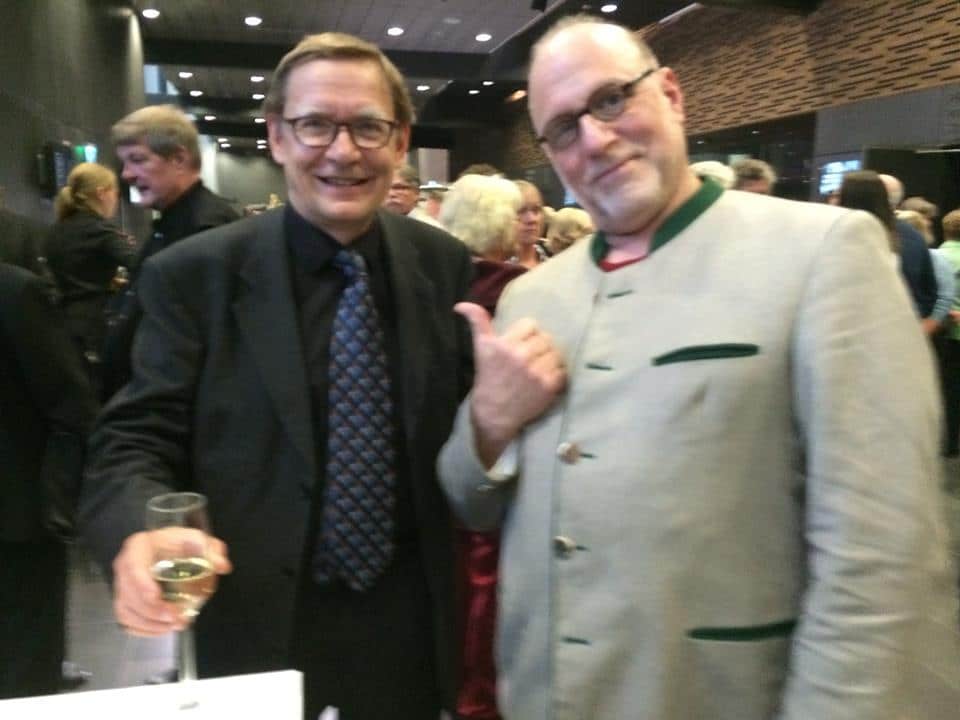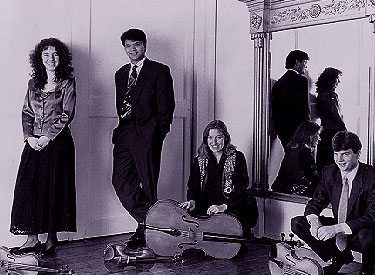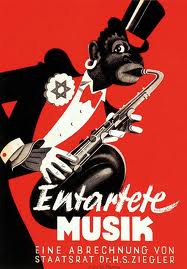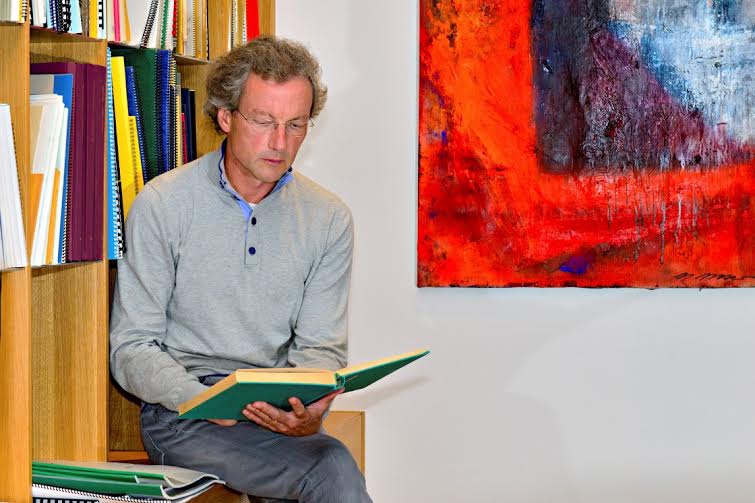The hyperactive Finnish composer Kalevi Aho turned 70 yesterday.
The birthday will be marked by Sinfonia Lahti on April 4 with the world premiere of Aho’s 17th symphony, conducted by Dima Slobodeniouk.

The hyperactive Finnish composer Kalevi Aho turned 70 yesterday.
The birthday will be marked by Sinfonia Lahti on April 4 with the world premiere of Aho’s 17th symphony, conducted by Dima Slobodeniouk.

From our moderator, Anthea Kreston:
The Fortnightly Music Book Club takes a final look at Vikram Seth’s An Equal Music. We also have a sneak-peek at the next club, with an exciting investigation into the life and sounds of Shostakovich. Fortnightly is designed for both in-depth readers and those simply interested in the topic at hand. The books are a jumping-off point for lively dialogue. So join us, in whichever manner you choose – it’s always great to hear from you all!
The British cellist Sally Pendlebury was a member of the Vellinger Quartet, the quartet which was studied by Vikram Seth during the writing of An Equal Music. The writing in An Equal Music is deeply personal, poetic, and the themes weave between lost/gained love, the struggle for musical fulfilment and the complex lives of a successful touring string quartet.
Reader Question:
Is it difficult for a quartet member to retain their individuality? How important is this, musically and personally?
Sally Pendlebury:
‘I think it’s quite hard to gauge how caught up ones identity becomes with a quartet. In the Vellingers we all did other things outside the quartet, each of us was in at least one other chamber group (although none of these met as regularly as the quartet) and we all had, either positions, or regular work with orchestras too. This was extremely important for all of us. I believe it served as outside nourishment and a source of interest and influence.
‘What I was totally unprepared for was the feeling of utter loss I felt when we gave our final concert and hung up our bows. I was bereft and felt strangely unsure of who I was anymore……in other words I had not understood quite how much my sense of ‘self’ was tied up with the identity of the quartet. I hadn’t bargained for that at all and the loss of belonging shocked me. I suppose it was an intense version of not knowing what one has until one has it no longer!
‘These days I’m playing Quartets again with the Fitzwilliam Quartet who are this year celebrating 50 years of playing together. They had already been at it for 48 years before I came along. It’s a very different feeling to step into a quartet with that extraordinarily legacy and who have tried and tested just about everything. One thing links these two very different quartet experiences though. It doesn’t matter how many years a Quartet has been together, once you start rehearsing some of the greatest music ever written, you are filled with awe and wonder and it can’t fail to be anything other than emotionally overwhelming and intense. I feel very fortunate to have a second chance to immerse myself in the repertoire and the quartet life.’
Thank you, Sally, for taking the time to speak with us.

Sneak Peek:
Shostakovich: the man, the culture, the music. We have an All-Star cast answering questions – from the author Elisabeth Wilson, to pianist Elisabeth Leonskaja, to Elisabeth von Leliwa, Vice President of the German Shostakovich Society. And other people not named Elisabeth! So get your kindles ready, or click on Amazon to get your hard copies. We will be reading 3 books – you choose which is your style, and submit questions according to your passions. In addition, the Artemis Quartet‘s CD release of the Shostakovich 5th and 7th Quartets, and Quintet with Leonskaja is due to be released next week. We will be investigating that audio as well.
Julian Barnes: The Noise of Time
Elisabeth Wilson: Shostakovich, A Life Remembered
Solomon Volkov: Testimony
Artemis Quartet: Shostakovich (Erato)
Questions can be left below in comments, or sent to Fortnightlymusicbookclub@gmail.com.
Franz Welser-Möst, presenting his 18th season as music director of the Cleveland Orchestra, has made Alban Berg’s Lulu the centrepiece of his season, together with works by others composers banned by the Nazis as ‘degenerate.
Franz said this morning:
‘One of the highlights of this next season is the opera, Lulu. It is an intense piece and a challenging work both musically and in its subject matter. Yet this kind of programming is successful in Cleveland because we have such an extraordinary, adventurous, and open audience. Each season, we program to challenge those of us on stage, but also to challenge the audience — to deepen their curiosity and to develop their interest in discovering new things. Just as we did a year ago with Wagner’s Tristan and Isolde, we are creating a festival around Berg’s Lulu. Together we will look at the relationship of art and politics in Berg’s lifetime — of how certain music in the 1920s and ‘30s was politically abandoned and prohibited. We are featuring works by Schulhoff, Krenek, and others — works that the Nazis labeled ‘Entartete Musik’ or Degenerate Music. It was a period of autocratic, authoritarian regimes who condemned any artistic expression outside of their narrow view with a heavy hand. Artists and their work were prohibited through censorship. Just as the character of Lulu is abused and abusive in her own way, we will look into how music and art can be abused by a system — and how a system can turn people on one another. These are important topics, not only from the past, but in today’s world.

‘We live in a time where angst is more and more a part of everyday life all over the world. One of the key elements of political populism is that there must always be a scapegoat — there is always someone, a group of people, or an idea to blame. For instance, Berg’s score to Lulu includes jazz elements — and jazz at the time of the 1920s and ‘30s was not widely accepted as ‘real’ art. Jazz musicians, black musicians, and minority composers were too often viewed as not having any value for society. So with this festival we are featuring jazz music, and other music, including a classical piece by the African-American composer William Grant Still. What we are doing is looking at great music, at great art, that was marginalized for all the wrong reasons.’
There will be a strong focus on symphonies by Schubert and Prokofiev and world premieres of commissions by the Israeli composer Oded Zehavi and the Austrian, Bernd Richard Deutsch.

Le Figaro has obtained the long list of 10 men and one woman being considered as next director-general of the Opéra national de Paris. They are:
Peter de Caluwe, La Monnaie (Brussels)

Joan Matabosch, Teatro Real (Madrid)
Jean-Louis Grinda, Opéra de Monte-Carlo
Christina Scheppelmann, Liceu (Barcelona)
Alexander Neef, COC (Toronto)
Laurent Joyeux, Dijon
Marc Minkowski, Opéra de Bordeaux
Olivier Mantei, Opéra Comique
Jean-Marie Blanchard, former Director of Théâtre de Genève
Dominique Meyer, outgoing director of Vienna Staatsoper
Christophe Ghristi, Théâtre du Capitole à Toulouse
We reported last week that the BBC is planning to abolish the BBC Concert Orchestra as part of £475 million in cuts that are needed, it says, to provide free TV to the over-75s.
The process appears to have begun. A leak to the Sunday Times today says the BBC CO is being withheld from live performances on Friday Night is Music Night, a programme popular among older listeners. It will be replaced by ‘cheaper ensembles’.
This is part of a drip-drip process that the BBC hopes will lead to a quiet orchestra abolition.
Be prepared.

UPDATE: We have received this response from the BBC press office:
A BBC Spokesman said: ‘The portfolio of work for the BBC Concert Orchestra has a number of strands which, can and do change over time. We are increasing their workload in some areas while reducing in others – none of this calls into question the orchestra’s future. The BBC has made no decision on the free licences for over-75s and as we have said we’ll make an announcement in June. Anything beyond that is pure speculation.’
The spokesman added: ‘The BBC Concert Orchestra will still appear in Friday Night Is Music Night, it’s just the number of original programmes with the concert orchestra within that programme which will be slightly reduced.’
Just up on Youtube:

The comment is made by Antonio Pappano in a DW-circulated English-language documentary on the great tenor.
Watch.
